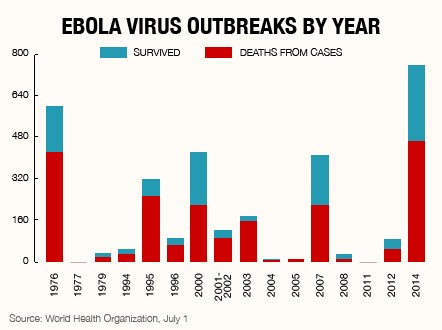
The international group Doctor
Without Borders warned Tuesday, 9/9/14, that the planet is losing the battle
against Ebola and lamented that therapy centers in West Africa have been
"decreased to places exactly where men and women go to die alone" as
the world struggles to include the illness.
In separate
remarks following a United Nations meeting on the crisis, the Globe Health
Organization chief stated absolutely everyone involved had underestimated the
outbreak, which has now killed a lot more than 1,500 persons in Guinea,
Liberia, Sierra Leone and Nigeria. U.N. officials implored governments
worldwide to send medical workers and material contributions.
Meanwhile in
Liberia, a missionary organization announced that a another American medical
doctor has been infected.
Physicians
Without the need of Borders, which has treated far more than 1,000 Ebola
individuals in West Africa is totally overwhelmed by the illness. Joanne Liu,
the organization's president callled on other countries to contribute civilian
and military healthcare personnel familiar with biological disasters.
"Six months
into the worst Ebola epidemic in history, the globe is losing the battle to
contain it," Liu stated at a U.N. forum on the outbreak.
In Sierra Leone, she mentioned,
infected bodies are rotting in the streets. Liberia had to construct a new
crematorium as an alternative to new Ebola care centers.
| Ebola Virus |
At the U.N.
meeting, WHO Director Margaret Chan thanked countries that have helped but
said: "We need additional help from you. And we also require nations that have not come on board to get on
board.”
Later at a news
conference, she warned that the outbreak will get worse before it gets better.
The effort also
requires protective gear, motorcycles, flatbed trucks and meals, said David
Nabarro, who is coordinating the U.N. response.
"The
outbreak is advancing ahead of us and we are falling behind," Nabarro
mentioned.
Dr. Tom Frieden,
director of the U.S. Centers for Illness Control and Prevention, stated this is
now the world's 1st Ebola epidemic, widely spreading in Guinea, Liberia and
Sierra Leone.
The latest
missionary to come down with the illness, a male obstetrician, was not
instantly identified. He did not operate in an Ebola ward. The group did not
specify how he contracted the disease, but it can be spread by way of vaginal
fluids.
A Liberian
physician on the missionary's therapy team stated it was too quick to tell if he
will be evacuated. The medical professional would speak only on condition of
anonymity due to the fact he was not authorized to discuss the matter with
reporters.
Last month, two
Americans, including one from the identical missionary group, had been
evacuated to the United States for remedy just after contracting Ebola in
Liberia. The two recovered following receiving an experimental drug known as
ZMapp. The manufacturer says it has run out of supplies of the drug and it will
take months to generate far more.
U.S. wellness
officials on Tuesday announced a $24.9 million, 18-month contract with Mapp Biopharmaceutical
Inc. to speed development of ZMapp. As element of the project, Mapp is to make
a tiny quantity of the drug for early-stage safety testing, although
functioning with the U.S. Department of Health and Human Solutions to
accelerate the manufacturing approach. HHS can extend the contract up to a
total of $42.three million.
The outbreak has
taken a particularly high toll on health
care workers, and nurses in Liberia and Sierra Leone have repeatedly gone on
strike to demand hazard pay and get better protective gear.
On Monday,
nurses at JFK hospital in the Liberian capital went on strike. The striking
nurses have been all from non-Ebola wards.
Information Minister
Lewis Brown said late Tuesday that the dispute had been resolved, but Dennis
said discussions have been ongoing.
Meanwhile, the
Sierra Leone government announced that nurses have been back at work Tuesday after
a strike at a Freetown hospital this weekend.
Earlier Tuesday, the U.N. Meals and
Agriculture Organization warned that food in nations hit by Ebola is becoming expensive
and scarce because some farmers cannot reach their fields.
Authorities have
cordoned off entire towns in an effort to halt the virus' spread. Surrounding
nations have closed land borders, and airlines have suspended flights to and
from the affected nations. Seaports are losing visitors and restricting food
imports to the hardest-hit nations.
These nations —
Guinea, Liberia and Sierra Leone — all rely on grain from abroad to feed their
people, according to the U.N. meals agency. For instance, the price tag of
cassava root, a staple in a lot of West African diets, has gone up 150 %.
"Even prior
to the Ebola outbreak, households in some of the affected areas had been
spending up to 80 % of their incomes on meals," said Vincent Martin, who
is coordinating the meals agency's response to the crisis. "Now these
latest price spikes are placing food entirely out of their reach."


No comments:
Post a Comment